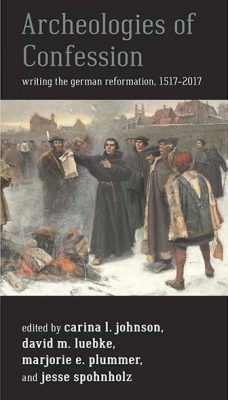 Claremont, Calif. (January 11, 2018)—Archeologies of Confession: Writing the German Reformation, 1517–2017, a collection of essays co-edited by Professor of History Carina Johnson, examines the formation of religious identities during the Reformation and the erasure of religious plurality from historical memory. Published by the Berghahn Books series Spektrum, the anthology was released during the 500th anniversary of the Reformation.
Claremont, Calif. (January 11, 2018)—Archeologies of Confession: Writing the German Reformation, 1517–2017, a collection of essays co-edited by Professor of History Carina Johnson, examines the formation of religious identities during the Reformation and the erasure of religious plurality from historical memory. Published by the Berghahn Books series Spektrum, the anthology was released during the 500th anniversary of the Reformation.
Joachim Whaley, professor of German history and thought at the University of Cambridge, describes the book as “a fascinating series of original and stimulating essays” that will prove “invaluable for scholars of the Reformation and of German religious history more broadly.”
The book’s subtitle, “Writing the German Reformation, 1517–2017,” underlines the long-term effects of the seismic societal shifts wrought by the Reformation, which split Latin Christianity between Catholics and Protestants following the publication of Martin Luther’s Ninety-five Theses in 1517. As alliances between states and institutional religious bodies, known as confessions, gained strength, evidence that did not fit with the dominant narratives was left out, or cut out, from history, Johnson writes in Archeologies of Confession.
“This book reveals that, for centuries, people have rewritten the Reformation to serve their own purposes and, in the process, eliminated religious plurality,” Johnson said. “People are constantly reshaping history in ways that serve their agenda.”
Archeologies of Confession excavates patterns and practices of religious identities that were buried over the centuries. The essays in the anthology argue that it is “time to go back to the archives, to the repositories of personal papers, to the critical editions, and ask what has been left out and why.”
The historians who contributed to Archeologies of Confession embrace the challenge of unearthing a purposely forgotten past. In the process, they examine the nature of history and the motivations of historians, responding to the need “to interrogate the historicization of the Reformation.”
“Only by further examining the uses of silence and erasure in the history of the Reformation, and by freeing historical memory from confessional concerns, can we meaningfully evaluate the role of the Reformation in the history of modernity,” Johnson writes.
The book demonstrates the ongoing relevance of history. Parallels can be drawn to contemporary times, from debates over whether the U.S. was founded as a Christian nation to Holocaust deniers seeking to redact reality. Historical precedent informs the choices we make today, Johnson said.
At the same time, history also shows us “the possibility of radical difference.”
“By studying history, you learn about human motivations and societies that don’t look anything like our present-day ones,” she said. “Those alternatives allow you to understand that the status quo is not inevitable, that things can be different.”
Carina Johnson specializes in the cultural history of the sixteenth-century Habsburg Empire and the historical role of memory and religious and cultural identities. She is the author of Cultural Hierarchy in Sixteenth-Century Europe: The Ottomans and Mexicans, and her work has been supported by grants by the Fulbright Program and Graves Foundation, among other institutions. Johnson co-teaches The World Since 1492; her other courses at Pitzer College include Queering the Medieval? Holiness, Heresy, and the Body as well as Religion, Violence, and Tolerance, 1450-1650. Johnson earned her PhD and MA in history from the University of California, Berkeley, and her BA in archeological studies and history from Yale University.
Archeologies of Confession: Writing the German Reformation, 1517–2017 is available through Berghahn Books and booksellers in the US and UK.